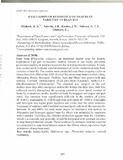Evaluation of resistance of Snap Bean varieties to bean fly

View/
Date
2011-09Author
Olubayo, F.
Ndiema, G. C.
Kasina, J. M.
Nderitu, J. H.
Misheck, D. K.
Language
enMetadata
Show full item recordAbstract
Snap bean (Phaseolus vulgaris), an important export crop for Kenya,
experiences high pest infestations leading farmers to use highly persistent
pesticides resulting in produce rejection due to high pesticide residues. A study
was carried out to evaluate varietal resistance of seven commercial snap bean
varieties to bean fly. The studies were conducted over three cropping cycles at
Mwea from Feb 2010 to Jan 2011. Each of the seven snap bean varieties (Amy,
Alexandra, Bravo, Serengeti, Paulista, Tana and Mara) was grown with and
without Confidor (imidacloprid (N-[1-[(6-Chloro-3-pyridyl) methyl]-4,5-
dihydroimidazol-2-yl]nitramide). The chemical was sprayed on the soil
surface three days after emergence and on the foliage ten days later. Data was
collected weekly throughout the growing period on plant stand, number of
bean fly ovipuncture marks, number of bean fly maggots and pupae and pod
yield. The varieties were significantly different in the number of plants
(P=O.OOl), marketable (P=O.OOl) and total pod yields (P=O.OOl). Alexandra
and Serengeti had higher plant numbers and yields than the other varieties.
Treatment of varieties with Confidor increased pod yield in all the varieties by
between 50 and 490% but only some degree of resistance was noticed in
Alexandra and Serengeti against bean fly which was enhanced by treatment
with Confidor. Therefore, for effective protection against bean fly, Confidor,
which is a relatively safe pesticide, should be integrated with resistant varieties
in snap bean production system. These two bean fly-resistant varieties could be
recommended to snap bean farmers in areas like Mwea which experience high
infestation of snap bean pests.
Citation
Optimimization of Agricultural Value Chains for sustainable DevelopmentSponsorhip
National Council of Science and Technology, The Kenya Seed CompanyPublisher
Faculty of Agriculture, University of Nairobi
Description
Oral presentation at aGRO 2011 Biennial Conference
